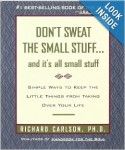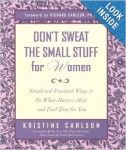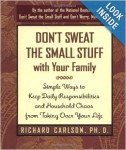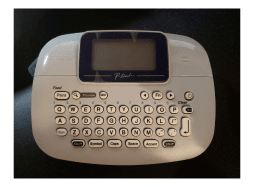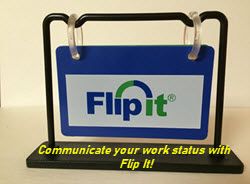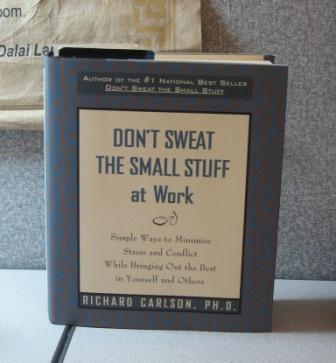
Sitting Proudly on my Cubicle Desktop
A few years ago, I remember a coworker of mine receiving the book entitled “Don’t Sweat the Small Stuff at Work” for a Christmas gift. I thought it was appropriate at the time since she was going through a lot of stress at work and it seemed like every little thing was bugging her.
Fast forward a few years later and what was under the Christmas tree this year from my youngest daughter? Yes, that same exact book. She knows about this website and how passionate I am about trying to make my working environment a much better place, not only for me, but for others.
Don’t get me wrong, I oftentimes experience stress at my workplace. Sometimes, even the smallest things get to me. You know, the small stuff that Richard Carlson is referring to in this book.
So, needless to say, I read the book and found that it was the perfect time for me to read this book. Richard, believe it or not, is a lot like me. He believes that it is up to the individual to make a conscious decision to better their life in the workplace. Sometimes though, I tend to lose sight of just that concept. For me, just reading the words, tends to reinforce the concepts that get away from me at times.
Here are some examples of Richard’s quotes and chapters in the book that really hit home with me.
Dare to be happy.
I know that it sounds a little bit corny but he writes that a lot of people simply don’t allow themselves to be enthusiastic or happy, especially at work. I know people who mope through their days at work while others always have a smile on their face. Richard Carlson pretty much comes out and says it’s OK to be happy at work because what is the alternative? He also has an expression TGIT in the book which stands for Thank God It’s Today instead of always living for the weekend. Instead of there being only a couple of days each week in which to be happy, any day can be a great day.
Remember to acknowledge.
This chapter and statement above really hit home with me. I am in the computer field and I provide internal users and end customers with reports or information that they have requested. I would be rich if I had a dollar for every time I finished a project, delivered the information, and did not hear as much as a Thank You from the end user. A simple acknowledgement of the work I did with an expression of gratitude goes a long way. It is simply one of my pet peeves in the workplace. This topic dovetails into the next topic.
Become less controlling.
What Richard is referring to above is that you don’t have to be defensive or anxious when others don’t act the way that you think they should act. So, when I say, it bothers me when someone doesn’t acknowledge the work that I do, I guess I am just expecting too much. I would always acknowledge when someone helps me out so I have the same expectations for others to react the same way I would. I guess if I expected less, I would be less disappointed and frustrated with the responses of others. This is great advice from Richard. No one should expect others to act in any particular manner. It only leads to disappointment more often than not.
Brighten up your working environment.
Boy, did this chapter resonate with me! He mentions in this chapter that his own office is so happiness-oriented that it’s almost impossible to be depressed while he is in it. I try to follow this same rule. I make my office as bright and inviting as I possibly can and I know I can even do more! He mentions that he has his office filled with family pictures and small artifacts from his kids like Beanie Babies that sit on a shelf.
He also mentioned that he has a tropical fish aquarium in his office to add some natural beauty and life to what could be a drab space. He cannot understand why others don’t make it a point to add some personality to their own offices. It’s no wonder that there are some people who dread heading into an office each day given the lifeless surroundings that they sit in for hours each workday. Brightening up your working environment are great words to live by each working day.
Be careful what you ask for.
This chapter really hit home with me. I guess there are always people at work who wish they had a more important job with more responsibility and more prestige. But, think about it for a minute. With that added responsibility might come more money, prestige, and a better office but is that enough to offset the additional work and stress that could come with that job? So, if you are asking for a better position in the company, just remember that the new job might lead to more travel and time away from your family. The added stress and responsibility might just not be worth it at the end of the day. So, Richard warns to be careful what you ask for because you just might get it…
This book is filled with some great advice to help you relieve some of the stress associated with those small things which, more often than not, end up being big things in time. Since I’ve read this book I have noticed that my productivity at work has increased significantly. Thanks to tools such as Dropbox that I have mentioned in a previous article, this book has been an additional tool for me to keep me focused on what really matters and to avoid the small stuff.
Richard Carlson has written many Don’t Sweat the Small Stuff books (as seen below) and I can guarantee that they will help you minimize the stress in your life. And there’s certainly something to be said about that!
Bob has been blogging for over 20 years and has been an office and cubicle dweller for more than 35 years. He has been featured in numerous online publications such as US News and World Report, Bustle, and Work Awesome (you can read his articles here). He created the popular office website CubicleBliss in January 2011 and rebranded it as WorkspaceBliss in April 2020.
In the office he’s been an IT Manager, Applications Engineer, Systems Analyst, Software Project leader, and Programmer Analyst in his long career. He’s a Certified Microsoft Professional and possesses a Masters of Science degree and two Bachelor of Science degrees, one of those in Informational Technology.
During his career he has worked in the office full-time, as a hybrid remote worker, and has worked from home permanently.

